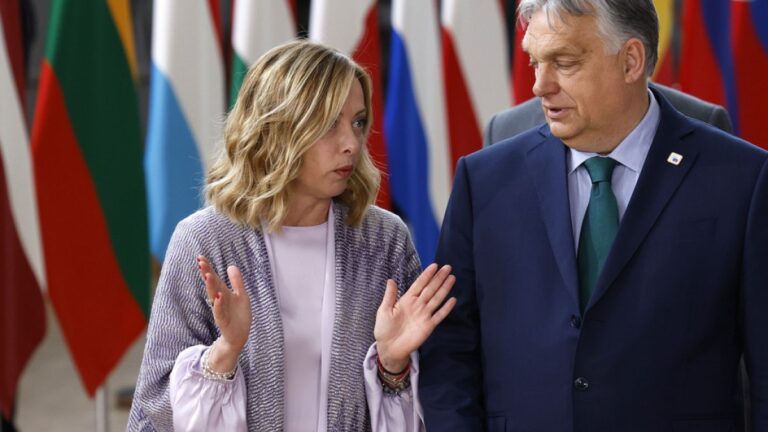This article was originally published in Italian
The Identity and Democracy group no longer has the numbers to represent itself in the European Parliament, and its members have been attracted to European conservatives and reformists and the new European patriots.
advertisement
The far-right in the European Parliament is at a critical juncture: after the European Conservatives and Reformists (ECR) group was officially (re)formed, other parties in the region are choosing sides.
The ECR currently has 84 MEPs, making it the third-largest group in Parliament, and as explained by its co-chair Nicola Procaccini (an Italian compatriot) who was just re-elected alongside the Pole Joachim Brudzinski, the party aims to have a major influence on European policy in the next Parliament.
“The political weight has clearly shifted to the right and the role of the European Conservatives will be particularly strategic given their position at the centre of gravity within the centre-right political reality, so this expansion gives us a particular opportunity to exert influence,” Procaccini told Euronews.
Meanwhile, European Patriots are working behind the scenes: the coalition of nationalist parties founded by Hungarian Prime Minister Viktor Orban together with Czech and Austrian nationalists needs more members to form a political group.
The candidates also include political forces now affiliated with a separate grouping, Identity and Democracy (ID), as well as Italy’s League and France’s National Rally.
The End of ID and the Strategies of Le Pen and Salvini
The departure of Matteo Salvini and Marine Le Pen from the MEPs would mean the final dissolution of the ID group, which already lacks the minimum number of MEPs needed to form a group – 23 from at least seven member states.
ID’s support was further eroded by the departure of six MEPs from the Austrian Freedom Party to set up the European Patriots Group, and by the departure of the only Estonian MEP to the European Conservatives and Reformists Party.
Two of Chega’s Portuguese MEPs are also due to join the new Patriots group, but they too will depart shortly, and they may be followed by a smaller delegation from both ID and unaffiliated groups.
“Some of these parties have a very pragmatic approach: they need a group that plays a role in parliament, leads committees and receives funding,” Francesco Nicoli, an analyst at the Bruegel think tank, told Euronews.
“So in the end they may compromise. I think they are more likely to join Orban’s new party than the ECR,” he added.
According to Nicoli, the League needs to be distinct from Brothers of Italy for domestic political reasons and therefore cannot form its own group in the European Parliament, so the natural (and perhaps only) destination for Salvini’s party is Orban’s Patriots.
On the other hand, Le Pen could follow a certain political trajectory that would bring her closer to the ECR group and make her appear more moderate in the 2027 presidential elections.
But the truth will only become clear next Monday, when both Patriots for Europe and ID are scheduled to hold their inaugural meetings.

